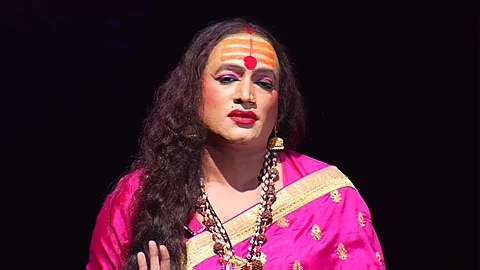

The TISS Queer Collective has issued a statement expressing its disapproval and disagreement with the public talk given transgender activist Laxmi Narayan Tripathi. They alleged that the talk made queer students on campus feel 'unsafe and threatened', especially by statements she made like "we will build the temple wherever Ram was born". She allegedly also asked for the full names of the students in order to gauge their caste and geographical location.
The talk was organised by the Democratic Secular Students' Forum (DSSF) on the subject of ‘LGBTQ+ Rights: Identity, Employment and Social Inclusion’. The Collective stated that the speaker did injustice to the aim of the talk by not discussing aspects of identity, inclusion and employment of individuals from queer communities within the wider politics of the state. The student group also criticised her for not addressing the theme of the talk and instead used the platform to 'give clarifications of her own political leanings and intentions' and to dismiss the critique she has received from various Trans, Gender-Nonconforming and Intersex collectives and individuals for the same.
They also pointed out the statement she made — "we will build the temple wherever Ram was born" and said, "We believe that such statements act as a thin veil through which a threatening and casteist ideology of Hindutva lays bare. The same ideas ring through her insistence on referring to the scriptures of Hinduism, which according to her are progressive and inclusive, and the adoption of completely subjective narratives of religion, scriptures, law, and science."
She received criticism regarding her denial of the intersectional nature of marginalisation and oppression. "Gender and sexuality do not work independently; they are embedded in the structures of language, religion, caste, class, geography and indigeneity. We empathize with Laxmi for the hardships she has faced because of her gender identity. At the same time we criticize her for using the same to deny the existence of casteism," they stated.
The student group condemned this 'mainstream savarna Hindutva homonationalism' and stated that it disregarded the queer community's fight for self-determination, " We condemn the politics of ‘uniformity’ that is convenient to the conformists and threatening to the ones at the margins. Laxmi’s insistence of knowing full names of the students who questioned her is another cause of worry for The Collective, as the same was used by her to gauge the caste and geographical location of the specific students."
The group claimed that queer students voiced their deep discomfort, "Students on campus who felt unsafe and threatened because of the nature of the talk and Laxmi’s patronizing demeanor." They also pointed out the DSSF that the talk further alienated queer students within the campus.
